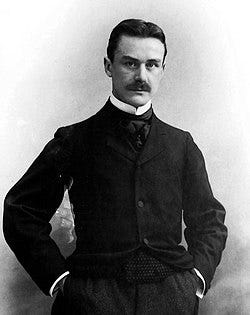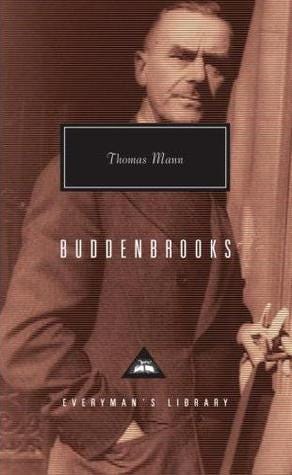“Damned if that was not a different epoch, when he had stood beside the senator’s father, beside Consul Johann Buddenbrook, during that historic meeting of the town council, and defied the onslaught of the raging rabble.”
Two experiences reliably give me a chilly, pleasantly dissociated shiver: looking down through airplane windows at human landscapes (circular crops like coasters made of green felt; cars moving along roads as thin as mercury strips); and watching time-lapse videos (unfurling plants; skyscrapers flickering upward). Both involve taking unnaturally expansive views — views that would have been impossible for our ancestors — of those vats of clear Jell-o in which we muddle through our lives: space and time.
But these shivers are brief and dizzying. For a longer and more tranquil high, there’s nothing like a yoga-block-sized, generations-spanning novel — there’s nothing like Thomas Mann’s Buddenbrooks.
I am, ordinarily, a fervent advocate of short novels — two-hundred pages seems to me about right, but I will happily go as low as one-forty. Rarely do I finish a book and think: if only that had been longer. But Buddenbrooks’ length (seven-hundred and thirty-one pages, in my edition) is not a defect, not a thing to overcome. The fact that it might take you a month or two to read — that you will feel as if you have been living among this family of melancholy grain traders forever — is the point. In a well-constructed large novel (and Buddenbrooks is beautifully constructed) the experience is one of scale; a decade in the book has the same enigmatic thickness, the same feeling of density and un-graspability, as a decade in a life. Reading Buddenbrooks isn’t like reading four short novels pasted together, any more than having one sixty-year marriage is like having four fifteen-year marriages. You look back and think: we lived all that.
What you’ll live through, in the book, is about four decades of one German family’s gilded decline: marriages entered into eagerly and exited in haste; bright young sons becoming gloomily burdened bosses; old powdered women becoming ancient powdered women. The book’s action is swift and clear, and rendered in mercifully short chapters. Mann is leisurely in his architecture, but brisk in his carpentry; there is none of that Henry James/Virginia Woolf feeling of needing to fight through curtains of linguistic lace.
But look at the views Mann manages to construct.
A little less than two hundred pages into the novel — in 1848 — there’s a tense town council meeting. The town’s machers, including the Buddenbrook patriarch and his friend Gosch, are inside, and an angry mob is chanting at the doors (“Retain restricted voting rights!” “Universal franchise!”). Germany is, for reasons that must have been vivid to Mann’s contemporaries, in political turmoil.
But this episode passes — there are fortunes to squander, marriages to dissolve — and we hear nothing about it for almost four-hundred pages. When, on page 567, Herr Gosch comes back on stage (a new generation now runs the company; all of Gosch’s old friends are dead), we greet him like someone we’re almost certain we’re supposed to know at a funeral: so good of you to come.
Gosch is doing poorly:
Old age, with its infirmities, was drawing near… his grave had already been dug. He could hardly put a glass of grog to his lips of an evening without spilling half of it, his arm trembled so damnably.
Most of what’s left to him is memory.
He had observed the world with eyes wide open. Revolutions and wars had raged… Damned if that was not a different epoch, when he had stood beside the senator’s father, beside Consul Johann Buddenbrook, during that historic meeting of the town council, and defied the onslaught of the raging rabble.
I was already enjoying the book by this point, but this is when I began to love it. Because four hundred pages was just enough time for me to have forgotten that council meeting (I love that Mann isn’t too proud to remind us of Consul Johann Buddenbrook’s name) — a couple of weeks in the life of a reader is in fact an epoch. So the feeling of remembering — of the book reaching back to touch its own cheek in wonder, of an old athlete paging through his scrapbook — is authentic, and earned. The most baffling and fascinating thing about being alive — that the very same us who was wriggling on the carpet in kindergarten will someday be writhing in a hospice bed — is almost impossible to talk about in a way that doesn’t sound insipid: I held you as a baby!
So Mann doesn’t talk about it; he enacts it. We, with Gosch, were there scheming at the meeting, and now here we are spilling grog on our shirt. A pilot doesn’t need to tell you how many hundreds of square miles you’re looking at. He just needs to fly you high enough to see it.




I look forward to your wonderfully insightful perspectives on important books (some I’ve only found important after your reviews). I am prone to purchase books you lift up. I wonder, is this your full-time occupation?